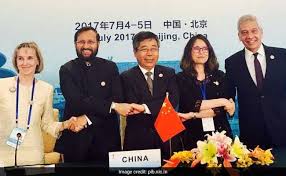5th Meeting of BRICS Education Ministers was held on July 5, 2017 in Beijing, China. The Indian delegation was led by Union Minister of Human Resource Development, Prakash Javadekar.
Highlights of 5th Meeting of BRICS Education Ministers:
While addressing the meeting, Mr. Prakash Javadekar appreciated the creation of institutional mechanism in the form of BRICS Network University and BRICS Think Tank Council.
- Under BRICS Network University proposal, 12 universities from each of the 5 countries will engage with each other in education research and innovation.
- The 5 areas of cooperation which have been prioritised are–Communication and IT, Economics, Climate Change, Water Resources and Pollution, and BRICS study.

- Javadekar highlighted some of the initiatives of the Govt. of India in education. He specifically spoke about the National Institutional Ranking Framework (NIRF), SWAYAM platform which has already hosted over 480 courses online, research initiative IMPRINT and Smart India Hackathon.
- Delegations from other BRICS Member states, similarly, spoke about education systems of their countries.
- At the conclusion of the BRICS Education Ministers’ meeting, a bilateral meeting was also held between Mr. Javadekar and the Education Minister of China, Mr. Chen Baosheng when bilateral cooperation between India and China was discussed.
Beijing Declaration on Education adopted
Beijing Declaration on Education was adopted in the 5thMeeting of BRICS Education Ministers in Beijing, China, on July 5, 2017.
- Beijing Declaration identifies some specific activities to deepen the cooperation among the BRICS Member States, encompassing the entire spectrum of education from school and higher education to vocational and technical education.
- According to the declaration, members states – Brazil, Russia, India, China and South Africa – are committed to the UN Sustainable Development Goal 4 (SDG4)-Education 2030 which aims to “Ensure inclusive and equitable quality education and promote life-long learning opportunities for all” that was set within The 2030 Agenda for Sustainable Development.
- The declaration reiterated support for the BRICS Network University (NU) to collaborate in the fields of education, research and innovation. It also encouraged universities to participate in the BRICS University League.
- BRICS member states also decided to increase cultural cooperation through language education and multilingualism to promote mutual understanding of the history and culture of BRICS member states and to undertake initiatives to promote professionalization of academics in higher education.
- The declaration emphasises to encourage more teachers and educational administrators to learn from experience of other countries in improving teacher quality and performance, and promoting the development of education through international exchanges.
Quick Facts about BRICS:
Acronym BRICS, refers to five major emerging economies viz. Brazil, Russia, India, China and South Africa.
- Originally as per term ‘BRIC’ coined in 2001 by then-chairman of Goldman Sachs Asset Management, Jim O’Neill, South Africa was not a part of this grouping. It joined in 2010 and thereafter these countries have been collectively referred to as BRICS nations.
- BRICS nations represent about 40% of world’s population and account for nearly 22% of gross world product.
AffairsCloud Recommends Oliveboard Mock Test
AffairsCloud Ebook - Support Us to Grow
Govt Jobs by Category
Bank Jobs Notification





